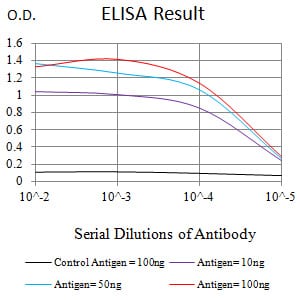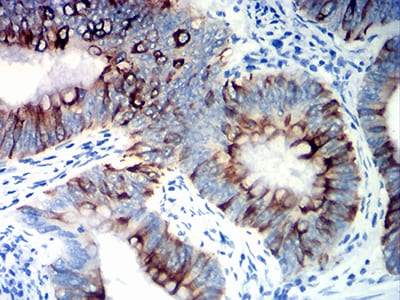

| WB | 咨询技术 | Human,Mouse,Rat |
| IF | 咨询技术 | Human,Mouse,Rat |
| IHC | 1/200 - 1/1000 | Human,Mouse,Rat |
| ICC | 技术咨询 | Human,Mouse,Rat |
| FCM | 咨询技术 | Human,Mouse,Rat |
| Elisa | 1/10000 | Human,Mouse,Rat |
| Aliases | K20; CD20; CK20; CK-20; KRT21 |
| Entrez GeneID | 54474 |
| clone | 2C7B9 |
| WB Predicted band size | 48.5kDa |
| Host/Isotype | Mouse IgG1 |
| Antibody Type | Primary antibody |
| Storage | Store at 4°C short term. Aliquot and store at -20°C long term. Avoid freeze/thaw cycles. |
| Species Reactivity | Human |
| Immunogen | Purified recombinant fragment of human KRT20 (AA: 1-150) expressed in E. Coli. |
| Formulation | Purified antibody in PBS with 0.05% sodium azide |
+ +
以下是关于KRT20抗体的3篇文献及其摘要概括:
1. **文献名称**:*"Differential expression of keratin 20 in human carcinomas"*
**作者**:Moll, R., et al.
**摘要**:该研究系统分析了KRT20在不同类型人类癌症中的表达模式,发现其在结直肠癌、胃癌和某些神经内分泌肿瘤中特异性高表达,而在其他上皮性肿瘤中表达缺失,提示KRT20可作为胃肠道肿瘤的可靠生物标志物。
2. **文献名称**:*"Utility of cytokeratin 20 in identifying the origin of metastatic carcinomas in immunohistochemistry"*
**作者**:Wang, N.P., et al.
**摘要**:通过免疫组化技术评估KRT20抗体在转移性肿瘤鉴别诊断中的应用,证实KRT20联合其他细胞角蛋白(如KRT7)可有效区分胃肠道来源的转移癌与其他部位(如肺、乳腺)肿瘤,提升病理诊断准确性。
3. **文献名称**:*"Comparative analysis of monoclonal antibody clones against keratin 20 in formalin-fixed tissues"*
**作者**:Böcker, W., et al.
**摘要**:研究比较了多种市售KRT20抗体的性能,发现克隆号KS20.8和IT-Ks20.8在福尔马林固定组织中的染色敏感性和特异性最佳,强调抗体克隆选择对免疫组化结果可靠性的关键影响。
4. **文献名称**:*"Keratin 20 expression in urinary bladder carcinoma: a potential diagnostic pitfall"*
**作者**:Jones, T.D., et al.
**摘要**:探讨KRT20在膀胱尿路上皮癌中的表达异质性,指出其表达可能随肿瘤分级变化,需结合其他标记物(如p40)避免误诊,特别是在低分化肿瘤中可能出现异常表达模式。
以上文献为KRT20抗体的应用提供了病理诊断、抗体性能比较及临床注意事项的关键参考。
×